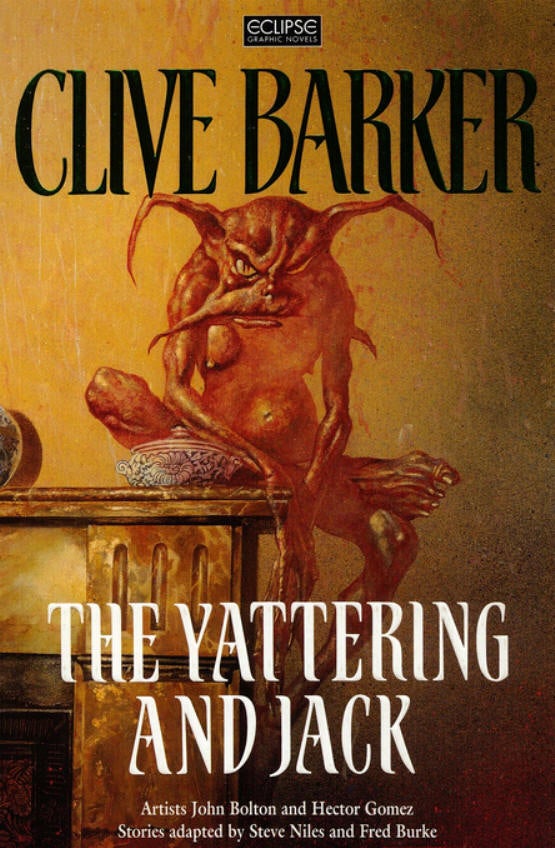
A
moment’s preamble:
In June of 2014 I began graduate school at Seton Hill seeking an MFA in
Writing Popular Fiction. This term I’m enrolled in a course that focuses on
MONSTERS, and as a part of that course I’ll blog on each book/story/movie
covered.
I'll break each review down into 4 parts: Strength of
Character, Genre potency, Poignancy of themes, and Entertainment Value. For
each of these I will assign a letter grade. My reviews will contain **SPOILERS**
The Yattering and Jack is a short
story from Clive Barker’s Books of Blood. It follows the efforts of a lesser
demon, Yattering, as he tries to drive a man named Jack Polo insane through all
manners of trickery. Jack Polo seems oblivious, but is actually playing a game
of his own.
Strength
of Character: B
The Yattering is just a lesser demon
trying to get ahead in a greater-demon kind of world. The poor little imp is
twisted and evil, to be sure, but he reminds us all of being ground under the
boot heel of bureaucracy. At least we don’t work for Beezlebub, the Lord of
Flies. Well, maybe some of us do?
Jack is more enigmatic, a man with a
secret. He pretends to have a dull, cheerful, and oblivious outlook. He is
actually manipulating poor Yattering into committing a demon-sin and forfeiting
his freedom. I didn’t get much of a feel for Jack or his daughters, but the
real story is about Yattering anyway. I liked the little guy, and I found him
to very well-drawn from a craft standpoint.
 |
| Don't do it, Yattering! |
Genre
Strength: B-
Similar to my earlier review of “The
Funeral” by Matheson, this story is pointedly comic, with only the window
dressings of horror. It makes it difficult for me to rate from a genre
effectiveness standpoint, other than to say it is nice to get a break from the
dreariness of reading constant horror. It was an amusing piece, and one I would
recommend to someone curious about horror but lacking the stomach for the truly
macabre. I suppose Yattering killing those cats was pretty horrifying, no
matter how you look at it.
Thematic
Poignancy: C
This story didn’t have an
overabundance of thematic depth, in my opinion, and that’s fine with me. It was
just a lark about a poor demon, an experiment in whether or not the reader
could find it within himself to root for something unabashedly evil. I think it
succeeded in that regard, and perhaps could teach us something about empathy
for the little guy superseding what other misgivings you might have.
Entertainment Value: B
This was a nice tale, and well
written. It made us laugh, made us question, even made us think a little. I
think it was the perfect length, as I expect something overlong would wear on
the reader as Yattering eventually does on Jack. I like the turn at the end,
when we discover just what Jack has been about all along: capturing himself a
demon-servant. And who can’t get behind that?
Random Notes and Final Grade: B-
 *I was left wondering whether or not
one Jack’s daughters had truly been driven mad. If so, points to Yattering.
*I was left wondering whether or not
one Jack’s daughters had truly been driven mad. If so, points to Yattering.
*That animated turkey bit was a
delight. It flew around spraying gravy, guys. I hope Beezlebub was proud.
*Clive Barker’s penchant for
headhopping worked a little less fluidly here, by my estimation, as it took me
longer to adjust to the occasionally abrupt POV switching.




